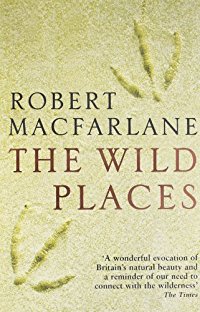Robert Macfarlane must surely be a rarity; he is not only a Fellow of Emmanuel College Cambridge, he is also an adventurer. And I mean like an actual sleeping-at-the-top-of-a-mountain-in-the-freezing-cold adventurer.*
In The Wild Places, Macfarlane journeys to several of Britain’s remote, isolated pockets, in search of the last areas of true wilderness. Dividing the book into chapters with evocative titles, like ‘Moor,’ ‘River’ and ‘Cape,’ he steps into Britain’s uninhabited nooks. Along the way, he tells the history of the places and stories of British people who loved those places… sometimes, more than they loved life.
In its historical interludes, Macfarlane can travel back decades, to the World Wars and deforestation, or it can travel further, to the glaciers and tectonic plates that shifted and formed the land itself. And he tells the stories of familiar characters through the unfamiliar (at least to me) prism of wilderness – George Orwell’s self-destructive love of northerly, bitterly cold Jura, or the poet & musician Ivor Gurney’s desperate love for his Gloucestershire woods. Without these characters occasionally dotting its landscape, this book would feel deprived of people; it would feel like walking through a people-less landscape, for around 320 pages.
Which is not to say that the book feels full of people – it doesn’t. Macfarlane has a unique ability to create and transmit a tone of loneliness and isolation. Nearly every journey he takes, he takes alone. Even when he brings friends, he leaves them at some point, to spend a harsher night out in the cold, on his own. Even when he runs into people on the journey, rather than introduce us to them and give us (and himself) the respite of their company, he opts, instead, to journey further alone. I found myself occasionally putting this book aside, preferring a novel, where I might get to meet some people. Then again, in Macfarlane’s eyes, the wild is a character, a rapidly disappearing and not-well-understood one at that.
On several of these trips, he seems to get patchy sleep, if any at all. And it strikes me that perhaps what adventurers are actually after is that feeling of really having done something that can only be gained through physical depravation. Macfarlane describes nearly everything he comes across** beautifully:
“The fire ate deeper into the peat slabs, and raced along the heather stalks so that they glowed like fuses. And as I blew, too, films of ash peeled themselves off the surfaces of the peat, and yawed up the flue, lifted by the hot air. They were patterned in grey and black, so that it seemed briefly as through dozens of little maps were lifting off from the peat’s surface, and vanishing up into the darkness of the flue.”
Collecting keepsakes from the landscape, a weathered stone from here, a bit of scrubby, dried-out moss from there, Macfarlane seems to be trying to push himself away from people, into the landscape, into wilderness.
And it is this pushing that gives a distinctly adventuresome air to what is, essentially, a beautifully written travel book about Britain. This is not an amble through Britain’s countryside, but a hike. And his language is not lyrical, nor lilting… but it does sing. If you find yourself of a mind to learn a bit about how people have changed Britain’s wilderness, and how the remote, isolated wild affects people; if you are interested in such a lonely song, I could recommend none better.
* I am not such an adventurer. I had to look up what a bivouac bag was.
** Such as his bivouac bag, the fish he caught, his maps and so on. The only thing he doesn’t seem to describe is carrying a notebook, strangely.
——
Have you read this book? Tell us what you thought of it, in the comments below, or over on Twitter.
Buy The Wild Places.

